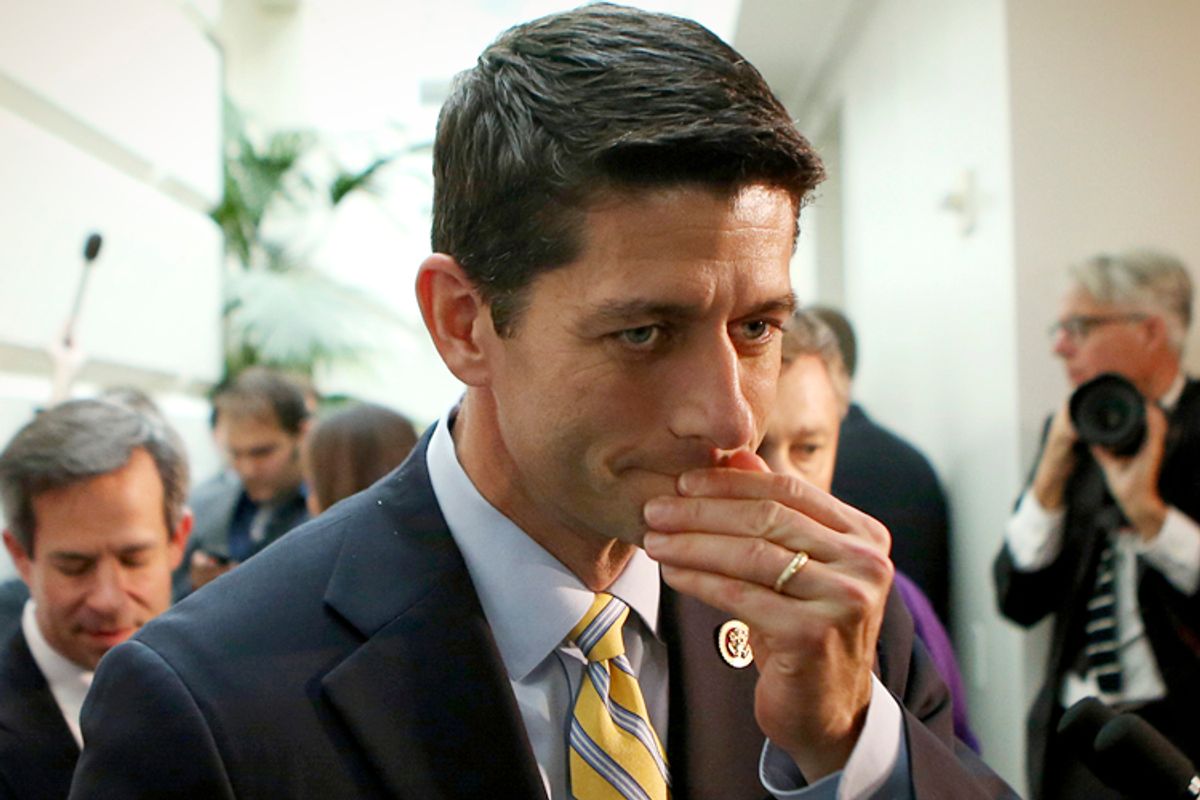The furthest-reaching political news of the week has nothing to do with who clogged the George Washington Bridge or what Robert Gates thinks of Barack Obama's completely justifiable skepticism of David Petraeus and the war in Afghanistan.
It came in a seemingly boring actuarial report from a government agency most people probably have never heard of, showing that for the first time since the 1990s, total U.S. healthcare spending grew at a slower rate than the U.S. economy at the beginning of the current decade.
This sounds like the kind of thing only wonks and other nerds care about, which is probably why it didn't become a #hashtag meme on Twitter or whatever, but the implications of the great healthcare spending slowdown are vast, and have thus reignited a long-simmering academic and ideological debate over whether, and to what extent, Obamacare deserves credit.
I'll get to the politics in a minute. But the boiled-down version of the debate is as follows. Healthcare inflation began slowing shortly before Obamacare became law, and has decelerated further since then. It's certainly possible that this correlation is strictly coincidental -- that the slowdown is entirely secular, or so overwhelmingly a symptom of the Great Recession that it will reverse itself when economic recovery is at hand.
But there's a decent chance that Obamacare has contributed to the slowdown, and prominent health economists -- including ones who don't have dogs in the fight -- are engaged in a lively effort to settle this very question. Opinion journalists and political partisans are engaged in a similar debate, although for very different reasons.
To Slate's Matt Yglesias, the answer to the Obamacare question isn't nearly as important as the fact of the slowdown itself. The slowdown has already reduced spending projections and suggests the ACA's coverage expansion won't swallow the budget, and so it really doesn't matter who pockets the credit.
"The point is that one major concern people had about Obama's coverage expansion is that it would exacerbate an unsustainable healthcare spending explosion. Had that proved to be the case, it would have been a huge problem for the coverage expansion. But in fact, spending growth is slowing. So the problem doesn't exist. I think the 'coincidence theory' strains credulity but even if it's true, the win is there anyway."
This is true insofar as your chief concern is with the workability of Obamacare's math. But it's a mistake to dismiss the argument over who gets the credit -- which brings us back to the politics. For the purposes of Obamacare's political viability, and more important, for the future of the national debate over the social safety net writ large, it really does matter whether the healthcare spending slowdown is a lasting phenomenon and whether we have Obamacare to thank for it. It's why conservatives have been so quick to reregister their insistence that the bending curve has nothing at all to do with Obamacare.
Part of that is just tired tactical reflexes. Obamacare can't be an abject failure if it succeeds in any key ways, so tautologically it can't be contributing to the deceleration of healthcare spending, now or ever. Relatedly, if it becomes established fact that Obamacare is responsible for reducing healthcare inflation, repealers will have a huge fiscal problem on their hands. They'll be arguing for hastening or rekindling the debt crisis they claim to be so terrified of.
And here's where a picayune concern that Obamacare might ever be credited with doing anything good widens into an existential threat to the conservative agenda.
For years now, Paul Ryan (among other conservative idols) has used terrifying charts of projected federal healthcare spending when arguing in support of proposals to slash and devolve programs like Medicare and Medicaid. Conservatives have supported ideas like these since long before the economic crisis swelled the debt. They have the same prescription for federal healthcare programs whether the budget has been in surplus or in deficit, whether the debt is shrinking or growing. But the now-shaken consensus that soaring costs will eat up larger and larger shares of the federal budget until Congress unloads them or the country suffered a fiscal crisis has been the right's central justification for its radical healthcare agenda.
In other words, the slowdown threatens the pretext for key elements of the conservative policy agenda. If it's permanent, it destroys the pretext completely. In a perverse way, the right needs healthcare inflation to return to unsustainable levels because without it, the enormous challenges of privatizing Medicare and crushing Medicaid become impossible. And if Obamacare is driving, or partially driving, the slowdown, then it probably isn't a temporary phenomenon.
That would be an enormous problem for the right, and the only solution would be to undo the cost controls in the Affordable Care Act. But they can only do that so long as the cost controls haven't demonstrably succeeded or at least aren't perceived to be successful. And that's why arguments over the question of what's behind the slowdown really do matter.
Of course, if Obamacare is responsible for the slowdown, the public can remain deeply divided over the question forever and it won't matter in the slightest. Conservatives can sow all the doubt they want about the causation, but they won't be able to reverse the damage to the GOP agenda without repealing the Affordable Care Act.
I think repeal is already an impossibility. But even if I'm wrong about that, it'll become impossible if the public accepts the law as a success. And that partially explains the urgency with which the right is downplaying the healthcare inflation news, and foreclosing on the idea that Obamacare should get any of the credit: Repealing Obamacare isn't just about Obamacare anymore -- it's about the rest of the GOP agenda and the right's generational fight against the post-New Deal consensus.

Shares